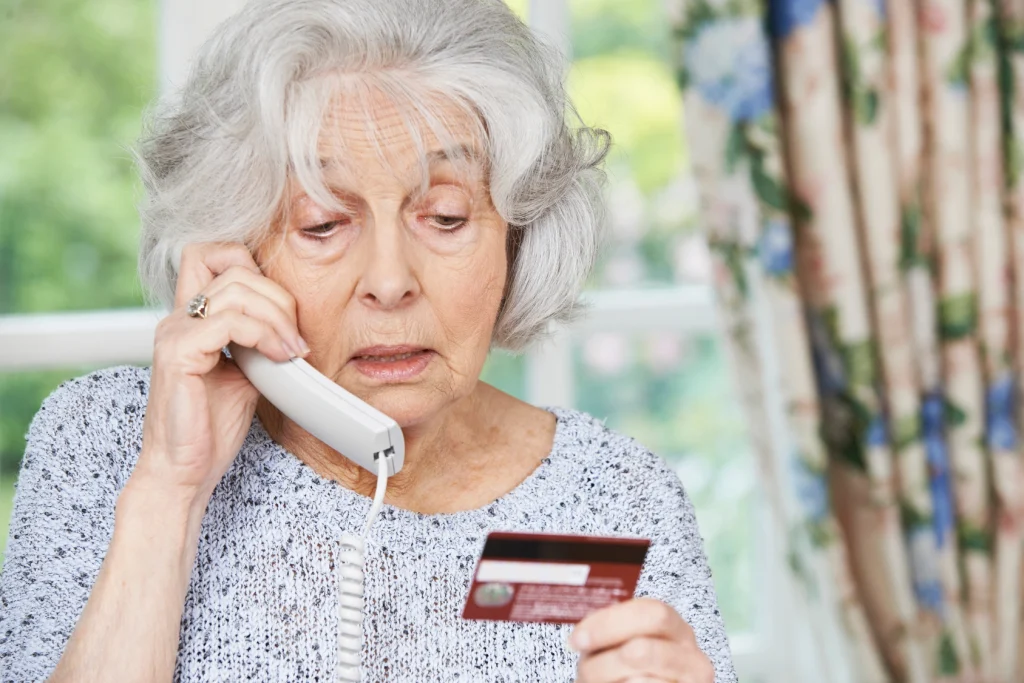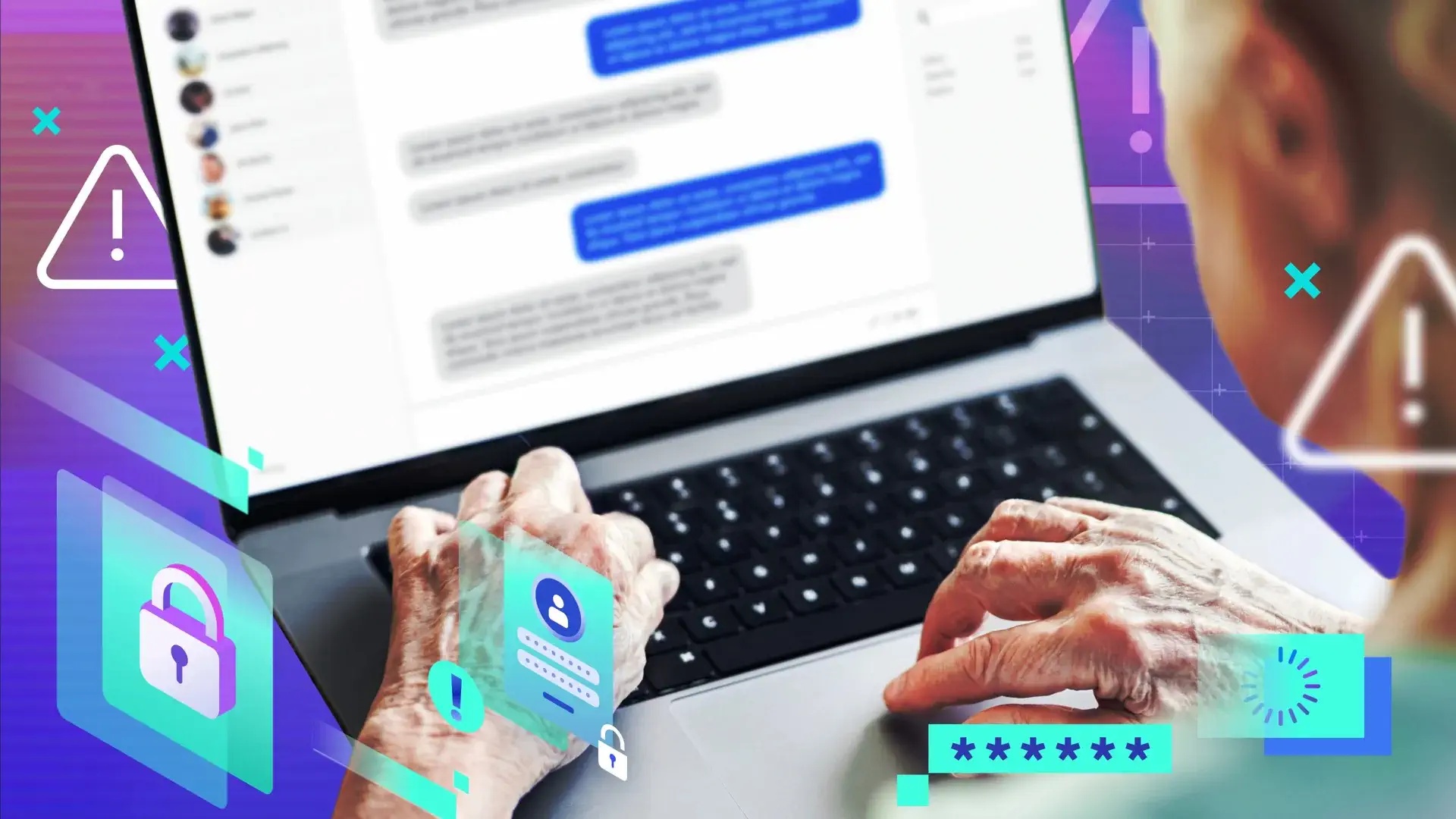
How to Protect Seniors from Phone Scams & Online Fraud
Unfortunately, many individuals, especially the elderly and those less aware of new technologies, fall victim to phone scams. Recognizing methods to prevent fraud against the elderly can help preserve their security and peace of mind. How to protect seniors from phone scams? In this article from the Human Health Mag website, you will become familiar with techniques and strategies that can help the elderly and their families confront these threats and increase your awareness in this area.
Why Are the Elderly Targeted by Fraudsters? Common Methods of Fraud
The elderly are often targeted because of their greater trust and less knowledge about new technologies. Additionally, they may consult less due to being distant from family and friends, which exposes them to increased risk.
Common methods of fraud against the elderly include:
- Fake phone calls that try to obtain the elderly’s financial information with false promises or urgent schemes.
- Sending fake emails and texts that appear to be from reputable organizations but aim to steal personal information.
- Many fraudsters exploit the elderly by selling them unnecessary or highly overpriced products or services.
Few Common Characteristics of Scam Calls
Before answering this question, How to protect seniors from phone scams? It is better to get acquainted with some features of these calls. Sometimes, it can be hard to tell if a phone call is a scam or not. The good news is that there are ways you can protect yourself. There are a few common characteristics of scam calls to watch out for:
If you receive a call from a phone number you don’t recognize or from someone you weren’t expecting. This could be a scam. Don’t share any sensitive or personal information. Think before you continue the call. If the situation seems suspicious, hang up.
If someone calls and asks for sensitive information. Sensitive information can include your username and password, financial account number, or Social Security number. If someone asks you for this information over the phone, they may be trying to steal your identity or money.
If the caller asks you for information to verify who you are before continuing the call, you should be extra careful in this situation. Scammers want you to react quickly and give out your information. Even if the person calling you seems genuine, it doesn’t mean you can trust them.

How to Protect Seniors from Phone Scams?
How to protect seniors from phone scams? In answering to this question that how can we prevent potential fraud? we say that by following some simple and practical tips, you can effectively protect yourself from phone scams. Certainly, Awareness and caution are your best weapons against these threats. What to do to protect yourself from scammers:
- The first step in preventing phone scams is recognizing suspicious calls. If someone claims to be a representative of a reputable company, always check the contact number and verify their identity.
- Introduce the elderly to various fraud methods and explain how they can protect themselves.
- Never share sensitive information such as your bank card number, password, or identification details over the phone. scammers often use tricks like claiming you’ve won a lottery or need to verify information to request these details.
- To reduce nuisance calls, you can utilize call blocking services. Best cell phones for seniors with dementia and many mobile operators offer this feature to their customers.
- One of the best ways to combat phone scams is to inform family members and friends. Family and close friends should maintain ongoing contact with the elderly to be aware of their situation and needs, and intervene promptly if any suspicious behavior is noticed.
- Verify the company that’s calling. Look up the phone number or company name. Some scammers pretend to be calling from real companies so they can trick you. Also, be careful if it’s a company you haven’t heard of. This could mean the company isn’t real and the call is a scam.
- If you don’t recognize the phone number that’s calling you, don’t answer the call. Let it go to voicemail and listen to the message later. Then, you can decide if you want to call back.
- If you encounter a suspicious call, definitely report it to the legal authorities.
- Legal advisors can provide guidance on legal matters and financial management for the elderly.
- Using software that prevents unauthorized access to personal information can help reduce the risk of fraud.
How to Protect Seniors from Phone Scams Online?
Online fraud targeting the elderly has become increasingly common, with the total number of reports nearly doubling over the past three years. Using the internet is a great way for the elderly to stay connected with loved ones, do weekly shopping, or find needed information with the click of a button. However, there can be risks while browsing the web, so it is important to take necessary steps to protect their security and personal information. In this following, we share some of the most important tips that are helpful for older people and keep them safe when using the internet and social media.
As technology advances, cybercrimes, identity theft, malware, and phishing activities have become increasingly sophisticated; therefore, be cautious when opening emails and do not pay attention if you receive messages from unknown emails asking you to take actions like downloading something, clicking on links, or providing personal details.
Remember, as fraudsters become smarter, it can be very difficult to identify a fake document, email, or website. If in doubt, ask a family member to check, always be careful when online, and avoid browsing websites you don’t trust.

Creating strong and unique passwords that are hard for others to guess is one of the best things you can do to keep your personal information safe online. Include a mix of uppercase and lowercase letters, symbols, and numbers, and make sure you do not use the same password for every online account and profile you have. Remember not to share your password with anyone and regularly change it.
Computers and phones, especially if they are old, are more vulnerable to hacking and viruses; therefore, ensuring that your computer’s operating system, phone, and any other device you use are up to date is very important for protecting yourself. You can also install security software such as antivirus or firewall to reduce the risk of exposure to viruses, hacking, or online scams. There are various options available in the market, so be sure to research the package that suits your needs and always use a reputable brand.
Practice Safety on Social Media
More elderly people are signing up on sites like Facebook, X, and Instagram. A recent report shows that nearly half of people aged 65 to 74 now have social media profiles. These sites are a great way to stay connected to loved ones, stay updated on news and current affairs, and learn about events that may be happening in their area. However, they can also be a place where people steal your personal information.
Remember, anything you post on social media can be seen by anyone. Therefore avoid sharing personal information like your phone number or home address. It is important to make sure your privacy settings are configured the way you want to control who can see what you decide to share. If you don’t know how to do this, ask a family member for help.
Online Shopping
Online Shopping from home has become fast and convenient, and data shows that nearly half of people over 65 now shop online, up threefold in the past decade. When submitting sensitive information online such as your name, address, and bank account details, it is important to make sure you are using a secure website.
Other signs you can look for to stay safe include the lock icon in the URL bar at the top and an address that begins with “https.” Also, make sure the online stores you visit are trustworthy and beware of fake websites set up to trick visitors into giving their personal information. If you doubt the validity of a website, leave it.
Finally, if you have concerns about your online security, talk to a family member or report the fraud to the relevant authorities.
Concluding Remarks
How to protect seniors from phone scams? Protecting the elderly against fraud is of great importance. By raising awareness and applying preventive measures, their security and financial health can be safeguarded. Children and grandchildren should play an active role in educating and supporting the elderly so they can live a calm and worry-free life.

Frequently Asked Questions
What are the most common types of phone scams targeting seniors?
Phone scams often include fake lottery wins, impersonation of government officials or banks, fake debt collection calls, and fraudulent requests for personal or financial information.
How can seniors identify a suspicious phone call?
Seniors should be cautious if the caller asks for personal information, creates a sense of urgency, threatens legal action, or refuses to provide verifiable contact details. Legitimate organizations rarely ask for sensitive information over the phone.
What should seniors never do during a suspicious call?
Seniors should never share their bank details, social security numbers, passwords, or any other sensitive personal information over the phone, especially if they did not initiate the call.
How can families help protect their elderly relatives from phone scams?
Families can educate seniors about common scams, encourage them to verify caller identities independently, help set up call blocking or screening services, and maintain regular communication for support.
What actions should seniors take if they suspect they have been targeted by a phone scam?
They should immediately hang up, avoid responding to further contacts, report the scam to official authorities or consumer protection agencies, and seek advice from trusted family members or legal advisors.
